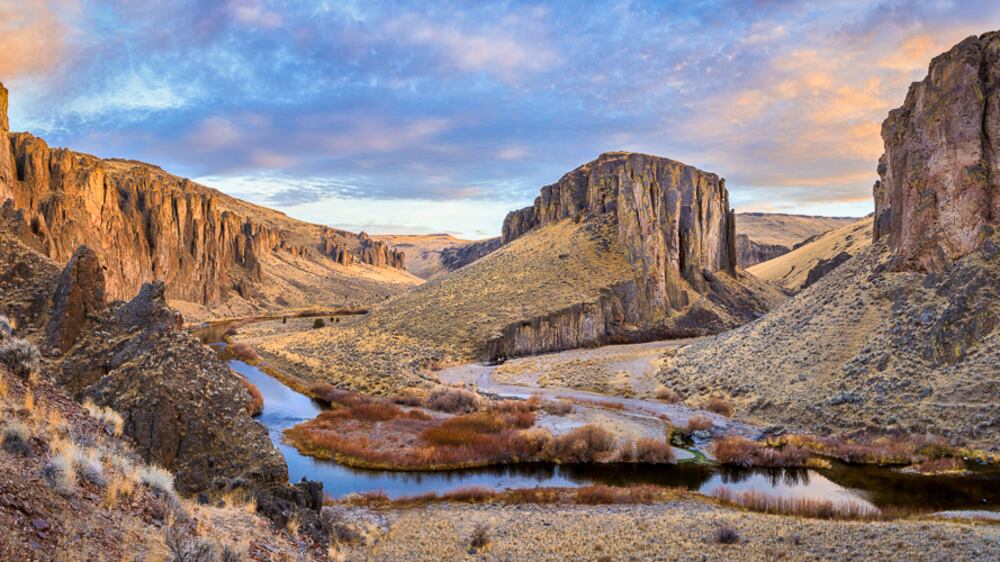This story has been updated with responses from Sen. Ron Wyden and Rep. Cliff Bentz.
After seeing Republicans sweep the White House and both chambers of Congress last month, Gov. Tina Kotek is urging President Joe Biden to designate the Owyhee Canyonlands in Southeastern Oregon a national monument.
That would protect the environmentally sensitive area from further commercial development, including mining.
“In August, I asked that a designation be prepared in case Congress failed to pass legislation before the end of the current session,” Kotek wrote to Biden on Nov. 22. “The devastating consequences for the future of this iconic landscape are simply too great not to act now. Please proceed with a national monument designation.”
That plea echoes a pressure campaign from Oregon environmental groups, led by the Bend-based Oregon Natural Desert Association and the Oregon League of Conservation voters. The groups have gathered more than 70,000 signatures in support of protecting the rugged region that some people refer to as Oregon’s Grand Canyon and have placed billboards in high-traffic locations, such as the Morrision Bridge exit off of Interstate 5.
Two members of Oregon’s congressional delegation, Democratic U.S. Sen. Ron Wyden and Republican U.S. Rep. Cliff Bentz have introduced bills in Washington, D.C., that would declare the Owyhee a wilderness area. That designation would provide a different and higher level of protection for the Owyhee than a national monument designation would. But a wilderness designation requires passage through both congressional chambers. Meanwhile, a president can create a national monument with the stroke of a pen.
Beltway dynamics are at play: Wyden has been pursuing Owyhee protections for many years. His bill, which would protect 1.1 million acres, resulted from a long series of meetings with a broad range of stakeholders in the Owyhee. The lightly populated region includes numerous cattle ranches and also sits on deposits of minerals, including lithium, and precious metals. Bentz, whose 2nd Congressional District includes the Owyhee, proposed a smaller, less restrictive wilderness area in a bill he introduced last month.
Neither he nor Wyden or U.S. Sen. Jeff Merkley (D-Ore.) has shown any enthusiasm for the national monument alternative. They would prefer a legislative solution. But the time for that is quickly running out, and a GOP-led Congress in 2025 is unlikely to favor protecting additional public lands.
Related: Ron Wyden Could Ask President Biden to Protect the Owyhee Canyonlands. Why Hasn’t He?
Kotek’s letter suggests she fears Congress will not have time to pass and reconcile Wyden’s and Bentz’s bills before year’s end, leaving a national monument designation the best option.
“The broad support across a spectrum of conservation, recreation, economic, and local interests reflects the collaboration and consensus we strive for in Oregon when seeking a federal action such as this,” Kotek wrote to the president. “I have appreciated our partnership with your administration on many important policy initiatives. This one would be a wonderful capstone to our work together.”
In response to Kotek’s letter, Wyden counseled patience.
“Sen. Wyden is still pulling out all the stops to pass locally driven legislation that reflects the comprehensive and local input he heard from ranchers, tribes and others in Eastern Oregon,” says Wyden spokesman Hank Stern. “The legislative route has bipartisan momentum in the House and Senate. And a bill remains the best path to protect wilderness, provide ranchers more grazing flexibility, and return ancestral lands to the Burns Paiute Tribe, rather than a monument that the incoming administration would likely move to undo at a moment’s notice.”
Bentz expressed frustration that Kotek, with whom he served in the Legislature for more than a decade, has taken a position without checking in with him about the region where he’s spent most of his life.
“The governor’s letter is a classic example of crying wolf,” Bentz said. “Sadly, whether it’s forest land, range land, farmland, the ocean, or the Oregon coast, the predictable Portland-centric approach is to ignore the people trying to make a living in harmony with these resources, and instead impose management techniques guaranteed to make things worse. The devastation the Governor should be talking about is what which has happened and is happening to the timber industry, the wastelands created by intense wildfires, the economically ravaged small communities, and the flow of business and people out of our state.”
